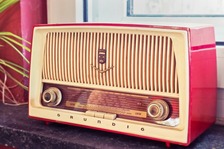
Most radio shows are conducted over the telephone, from any place in which there is a good connection, no background noise and where you can talk uninterrupted for the length of the show. Here are several guidelines to make telephone interviews more effective:
Know the Time: As you agree upon the time and date with the producer, confirm your time zone. The producer may say he or she will call you at 3:00, but is that 3:00 p.m. in your time zone?
Use a Land Line: Don't use cell phones. This is also not the time to impress your friends by having them listen in while you give your interview over speaker phone. These two methods can mess with the sound quality or provide static or feedback.
Be Prepared: Have a specific area set aside for telephone interviews, one in which you can keep your notes, books, and pad of paper handy. Unplug nearby phones if they are on a different line. Nobody will say, “You’re on the air,” so always assume the microphone is hot (live).
Play Along: Your host may want to give the audience the impression that you are in the studio. He or she may say, “Here with us today is Brian Jud, author of the media-training video program You’re on The Air.” Take the hint and do not make comments such as, “How’s the weather out there?”
Listen In: While you are on hold, either before you begin the interview or during a break, you will hear the station’s regular programming. Listen for key points to which you can refer later. On long shows, the host may talk to you during the break to plan what you will discuss during the next segment.
Use a Headset: This one is based on your personal preference, but sometimes it's nice to conduct an interview hands free. If you have a speakerphone, engage it during the breaks only to give your ears a break.
Heed Breaks: Before a long show starts, ask when breaks will occur and how long each will be. Listen for the show’s theme music, which will usually start at low volume and increase as it leads to the break. Close your answer as the music begins.
Hydrate: Keep water nearby and drink it generously, but only during breaks so the sound of your swallowing is not heard on the air (and if the water goes down the wrong pipe, your coughing will not interfere with your interview).
Don't Read from a Script: You may have sent the producer a list of questions in advance. If so, keep the list in front of you, but don’t read lengthy answers. Write a word or two that will prompt you to reply.
Keep Track: After two or three shows in one day, you may begin to wonder if you are repeating yourself. Make notes as you speak to remind yourself of what you said earlier.
Remember Names: Write the host’s name phonetically at the top of your note pad and use it during the show. Do the same with people who call in to ask you a question during the show.
Mind Your Body Language: Sit in a comfortable, quiet chair. If you gesture frequently, try standing as you speak. Keep your head high to open your breathing passages; relax your jaw muscles and you will speak more clearly.
Give Yourself Time: Do not schedule telephone interviews too closely together. Invariably, one will be delayed due to an unpredictable event, perhaps impinging on the time allocated to another show.
Be Polite: Rarely will you get bumped (canceled on short notice), but it can happen. If so, be polite and reschedule your show for another time.
Spell It Out: At the end of the show, you will get the chance to tell the listeners where they can find your book. Spell any words that may be confusing (For example: “My email address is michellegines60gmail.com. There is two ‘l’s’ in Michelle.”)
If you are thorough in your preparation, you are more likely to have a great show. The interview will be conducted between two professionals, both trying to create an interesting, informative and entertaining conversation to meet your respective objectives. When this occurs, you will be asked back to repeat your performance. And you may even sell some books.
For more tips and tools, check back with Purpose Publishing at www.PurposePublishing.com
To Your Success,
MG
 RSS Feed
RSS Feed
